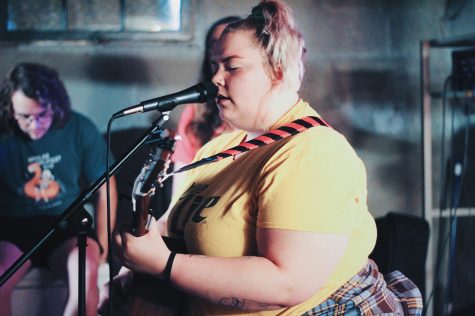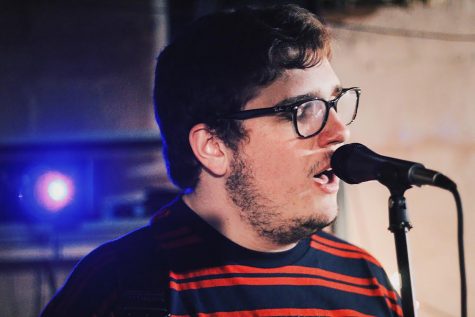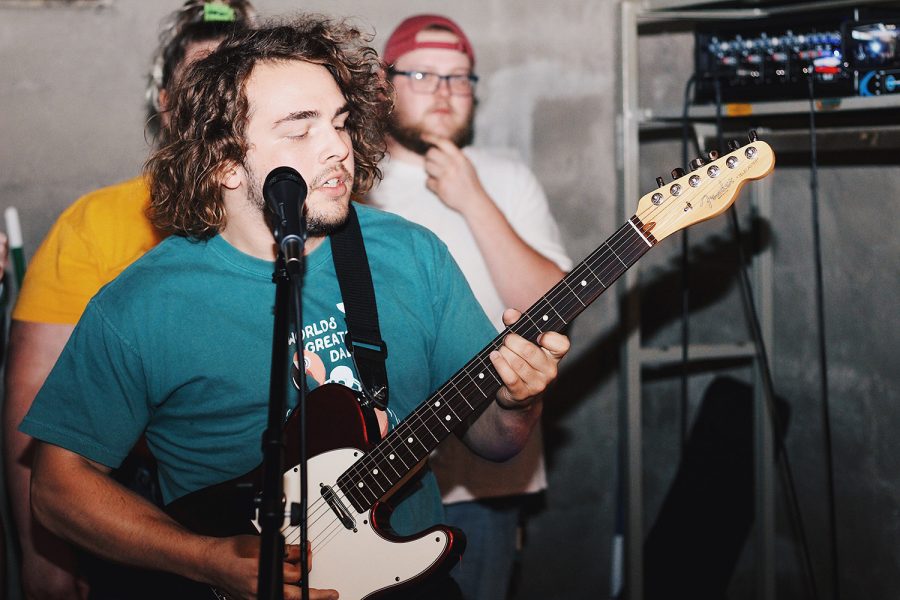House shows provide haven for DIY music scene
Local house venues in Iowa City create an open space for the DIY music scene to thrive.
Contributed/ Shiara Crilly Photography
Processed with VSCO with hb2 preset
On the outside, it looks like any other neighborhood house. On the inside, it’s an underground music venue, where the DIY music scene flourishes.
House shows are full-fledged music venues created out of everyday houses. A section of the living room or basement is set aside for a stage full of instruments and electrical equipment, where the audience can crowd just feet away from the band. The result is an immensely intimate show.
While the house-show scene started with garage bands in the ‘60s, exploding under the punk scene in the latter half of the ‘70s, it has persisted over the years and music genre changes.
Last month, Iowa City house venue Beta Cuck House hosted Cucktober Fest, which brought 14 bands together for an afternoon and night of music. Katy Kelly, the lead singer for local band Basketball Divorce Court, helped book Cucktober Fest through connections she had made through the DIY scene.
“I booked Cucktoberfest, and most of the people I booked I knew,” she said. “There were a couple I didn’t know, but they were recommendations from people I knew. Twitter and Facebook are where I have found booking is the easiest in finding bands, because they tell you, ‘hey we’re going on tour.’ ”
Social media, such as Twitter account DIY Midwest, can connect local venues and bands into a network where touring bands can find a stage in each city they visit. Along with flyers, Facebook can be used to advertise shows. On most event postings, venue owners will tell people to direct message them for the address to help keep the venue a safe space.

“That’s the easiest thing to do if it’s not at a bar, because if people who genuinely want to come show up, I’ll give you the address,” Kelly said. “I’ve had to tell people, ‘Hey, you’ve made an event not safe before, I’m not going to give you the address.’ ”
Keeping the neighbors happy in a residential area is also a key factor in sustaining a house venue. Kelly said house shows do this by abiding by the noise ordinance in each town, ending their shows by 10 p.m. at the latest.
“The thing with house shows that you see a lot, and this is a big difference — house shows usually start music at the latest at 7, whereas you see bars and it’s 8 or 9,” Kelly said. “The main thing is noise ordinance, and it really depends on the town.”
Around 40 minutes away in Marion, the Plaster House serves as the local house venue. Shiara Nivana Crilly, who lives there currently, said that it was initially started three years ago by Gavin Brown, who named the house because of the recent renovations within it.
“Our house is a two-story local house with a basement. Normally we have the band play in the basement, because we do live in a neighborhood,” she said. “The basement window has pillows in them to help muffle the sound. Since we live in a quiet residential area, we try to make sure that we don’t bug our neighbors as much as possible.”
Crilly said they also abide by the noise ordinance, making sure shows don’t run past 10 p.m. The immense effort that goes into booking and throwing a house show is all to build an intimate environment, where the band and audience can get to know each other.
“For our house for instance, it is in a basement, so everyone is on the floor. There’s maybe a foot between you and the band at the time,” Crilly said. “You know the band, you’re able to be in that space with them and just kind of create that energy that’s like, ‘Wow, this is the music that got me through really tough times,’ or ‘I just really liked it.’ ”
Kelly echoed this sentiment.
“You can really listen to the singer and see their emotion more, in my opinion, and you can interact with the crowd more from my stance,” she said.
For University of Iowa Communications Professor Kembrew McLeod, the intimacy of the DIY scene led to a moment he regards as one of the most memorable and transformative experiences in his life.
While attending the James Madison University in Harrisonburg, Virginia, McLeod got involved with “a conglomeration of punks, hippies, and other alternative types,” who would host house shows for local and touring artists.
McLeod’s friends began to bring musicians to the CornRocket house, named after the band that lived there. One such band that was booked multiple times was The Nation of Ulysses, a famous Washington punk band, who ended up bringing the biggest name in riot grrrl history, Bikini Kill, to the house in 1991.

Bikini Kill, who formed in 1990, is a female punk band led by frontwoman Kathleen Hanna. That night, McLeod sat perched on a ratty couch in the basement, feet away from Hanna, who had started the show by calling out, “girls to the front.”
“It was just the most mind-blowing thing to witness because what I saw was social/cultural change taking place that moment,” McLeod said. “It was the first time as a clueless 20-year old guy having never thought about the sexual politics of the pit, and the way that a lot of women literally get excluded from those spaces. Kathleen Hanna’s first thing she said was girls to the front, and the girls ran to the front, and it was the most amazing experience to see.”
McLeod said he sees the house show scene as lasting forever.
“As more restrictions on live music are imposed in a variety of ways, whether they have to do with regulations regarding the age of admission to particular bars or any venue that serves alcohol, or anything else that that sort,” he said. “I see house shows as basically the release valve that allows for scenes to continue to percolate up underground even if there is basically institutionalized repression at the level of the more established venues and clubs and bars.”
Related: Ballad of a Tribute Band: The shared love of past artists unites musicians
As far as the Iowa City scene, houses such as the Beta Cuck house offer opportunities for new local bands to take the stage. Payton Lentz, who lives at the house, said that bands in Iowa City are constantly forming.
“No matter how many bands I hear of, there always seems to be another I don’t know about,” he said. “It’s pretty all over the place. Bands will come and go quite often.”
Lentz said part of the reason for the DIY music scene’s success in Iowa City is because of the availability of the venues such as Yacht Club and Gabe’s for local bands, and because of the interest in local music in the area. He said that while the music scene in Iowa City is expanding, the future of house shows is more dependent on those who live there.
“I don’t really know if house shows will get really bigger, that’s just depends on who’s renting houses and wants to try to do house shows,” he said.



